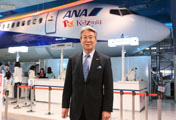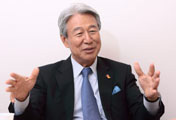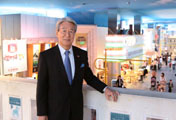Einosuke Sumitani, Kids City Japan K.K. CEO
Never Lose Fighting Spirit
Want to make an impact on Japanese society in which the meaning of occupation is getting harder to grasp



─ KidZania is a facility where three to fifteen-year-old children can experience a number of jobs. It is attracting attention as “edutainment” -a coinage derived from education and entertainment- and is succeeding in terms of sales. I hear it started out in Mexico, so please tell me the reason you brought it to Japan.
I resigned the position of CEO of the food service company at the age of sixty in 2003. I was thinking of living in retirement, but one day I heard from a friend of mine about an interesting facility in Mexico. I had not been interested in entertainment facilities till that time, but when I heard that children can experience various jobs there, I got interested. Visiting the facility in Mexico, I was surprised that children’s eyes were shining when they were “working.” Adults are narrow-minded and tend to think that children only like playing; however, they are actually very interested in adults’ work, and they want to experience it. Because I was worried about the fact that the number of young people who were not enthusiastic about their careers was increasing, those children who were so excited about their work experiences looked very fresh in my eyes. In Japan today, lots of children are forced to study for entrance exams, and grow in an environment where “play” often means passive entertainment, such as doing they play with TV games or going to a game center. Studying or knowledge is of course important, but children will end up becoming very passive young people in the real world if they only continue studying. This has been pointed out as a social problem, but nothing has come out as a solution yet. I felt that KidZania could make a big difference in Japanese society. After two years of preparation, I opened KidZania Tokyo in 2006. It has received lots of attention and is visited by many children.
─ What meaning do you think it has to have a career experience during childhood?
At KidZania you can experience more than eighty jobs such as Firefighter, Pilot, DJ or Pizza Chef. For example, you actually make hamburgers spending about thirty minutes as a hamburger shop clerk. Children can be proud of the fact that they did make hamburgers like the ones sold at real shops. If you try the job of Firefighters, you actually distinguish fires; if you try DJ, you speak through the microphone. The experience of feeling successful in their challenge to do real job leads to their joyful feeling of success that comes from challenge. In the society of adults, sometimes salaries are raised as an incentive. However, it is only effective for a short period. A carrot dangled in front of you disappears right away once you eat it. In fact, it is not possible to keep raising salaries forever, and it makes no sense to me to try to get people motivated by something outside of their mind. What is important is that even if there is no carrot, you have experienced the joy of raising the level of yourself by doing something challenging. Work experience at KidZania could be a chance to provide children with such joyful experience.
─ In March, KidZania Koshien was opened in Hyogo Prefecture.
We are planning to open some more KidZanias in Yokohama, Nagoya, Kyoto and Fukuoka. Each child has her or his own personality; there is a child who enthusiastically tries many kinds of jobs, but there is also a child who tries one particular job earnestly. I have never seen a child leaving KidZania without doing anything, no matter how shy she or he may be. Everyone tries something when they come to KidZania. I believe such experience of challenge and success remains in their hearts.
Joined Keio Swimming Club and lived in the dormitory in Hiyoshi
─ You were born in Wakayama Prefecture and grew up in Osaka. You joined Keio at university. What made you go on to Keio?
That’s an easy question – water polo (laughs). When I was in Osaka Prefectural Ikeda High School, I went to both of the inter-high-school athletic meet and sports festival two times. In my senior year, I was chosen to be in the all star team of high school students. In September of my senior year, the coach, who is a graduate from Keio swimming team, told me to go on to Keio, and I decided to follow. After that, I completely changed my lifestyle from swimming only to studying only, and got admitted into Keio. I hear that today there are exchange students living in the Shimoda Student Village at Hiyoshi dormitory after the renovation, but at that time, only sports club members lived for four years. I did cleaning and washing for myself, and did cooking by turns. I heard that in other universities, students were told to wash their seniors’ clothes, but at Keio such a thing didn’t happen. I got textbooks or school uniforms from seniors, and had a good time in the dorm. In the early 60s, Keio water polo team was so strong that the team was always among top fours both in the league and in the inter-college competition. Unfortunately, our team couldn’t win the championship when I was in the team. My position was goalkeeper. In my junior year I was selected as a member of the national team of college students, and participated in Universiade in Porto Alegre, Brazil, and we got fourth place. However, I was extremely disappointed when I was left out of the final selection for two goalkeepers for Tokyo Olympics in 1964. However, two years after I started my career, I took a part in the Asia Competition as a member of the national team, and won the first place. I was allowed to continue water polo for two years when I joined the company.
─ The company you joined is Fujita Kanko, which runs hotels and leisure facilities. What was the reason you chose the company?
That started from one of my seniors’ suggestion, but thinking back, I was interested in hotel industry and I enjoyed reading the magazine, “Hotel and Restaurant” in my student days. For the first two years, I was taught the basics of hotel work such as making the bed, cleaning and kitchen work at Hakone Hotel Kowakien. The third year, I was selected as the leader of the Naoshima Island development project in the Seto Inland Sea -Fujita Kanko owned the southern half of the island at that time. Although the island is famous for the Art Sight by Benesse Corporation now, it was a very inconvenient place without electricity, water or phone. I was sent to the island for the purpose of developing into a resort place. Starting with infrastructure development, I worked on building a camp village, miniature golf course, and selling travel agencies a packaged tour using train and ferry. I had no fears in my mid-twenties; I did anything that I believed in. In my days at Fujita Kanko; I was taught what hospitality meant at Hotel Kowakien, and I got practical knowledge of the basics of business development in Seto Inland Sea. Those experiences are applied in my work in restaurant industry and KidZania.
In 1969, you started a company with one of your seniors of the water polo team, and became independent. It is surprising that you were only twenty-six years old.
I was full of confidence. I believed I had in myself something that enabled me to raise the level of what I was then, and I was eager to try something challenging. I established a company named WDI with him, and did a variety of things such as planning a bowling alley, selling jewelries and so on. Most interesting was the agency of foreign hotels and airlines. The headquarters was located in the United States, and we were their Japan branch. We marketed Biltmore Hotel in Los Angeles or Mount Quick Airline in New Zealand to Japanese travel agencies such as JTB. People tend to think you need to be fluent in English to work as an agent of companies overseas, but you only need skills good enough to communicate in English. What they want is your work skills, not great English language abilities. You gain their trust when they talk to you face to face and feel your enthusiasm for work. Neither your English skill nor your age is an issue. In 1972, American fast food became a boom in the restaurant industry as “McDonald’s” and “mister. Donuts” started their business in Japan. We also got into the restaurant industry as a franchisee of “Kentucky Fried Chicken”. It had been said that there was no good food in the United States, but once young Japanese people knew the fast food, that image changed: American food is cheap and delicious. In this favorable mind, we opened about thirty shops of Kentucky Fried Chicken. After getting the knack of the restaurant industry, we obtained the licenses of direct management, not as a franchise, from “Tony Roma’s,” “Spago,” and “Hard Rock Café.” Those companies first approached major trading companies, but it took too long to reach an agreement. We were quick at decision making. In the case of “Spago,” which was getting attention for its popularity, it took only thirty minutes for us to reach an agreement. Speed is very important in business with companies abroad.
─ That experience must be very useful in KidZania. I guess you need great courage to bring a nameless Mexican company into Japan.
KidZania is in a different field from restaurant industry, but with a long time period of experiences, I think I have got a refined sense of what customers need. I believed KidZania was needed for Japan today since young people’ s views of occupation are in a blur. When I look back on how I acquired such a way of thinking, I realize it originated in Keio’s founder Yukichi Fukuzawa’s principles of “independence and self-respect.” The very first book of his that I read was “Autobiography of Yukichi Fukuzawa” as I thought I should know something of Keio before taking the entrance exam. I was impressed by his dynamic way of life. After entering Keio, his episodes were often introduced in class, and each of them was full of his “principles of independence and self-respect,” which deepened my respect for Fukuzawa. It is my understanding that Fukuzawa believed that it makes good sense only when learning is linked to and used in the real world. What he said, I understand, was that it is significant to challenge yourself by keeping yourself strong; it is not going to be useful to society if you just play with words or store knowledge in yourself. His idea was so persuasive to me since he linked himself to the real world by opening the School of Keio and produced a large number of people working for the economic society and influenced Japanese society by writing enlightenment books.
─ Lastly, may I have a message to Keio students?
Like those children who try work experience, I ask Keio students to try doing whatever they want. Even if you make mistakes, you can try again and again when you are young; what you get from your failures is even more valuable than what you get from your success. Talking about failure, I was not able to join the Tokyo Olympics when I was a senior at Keio. It was a big failure for me. I was extremely disappointed, and I complained to my mother for the first time. However, she then said brightly, “A lot of things happen in life.” I was so relieved by those words. Certainly, a lot of things happen in life. Being left out of the Olympics and winning the championship of the Asian Games are also among those many things. Life is interesting because there are a lot of things happening in life. Unless you try to overcome hardship you face, there is nothing you gain. I ask you not to run away; become a person who is willing to experience a lot of things that are not just happy but also sad. And, keep challenging yourself the future with Fukuzawa’s principles of “independence and self-respect” at the bottom of your heart.
Mr. Sumitani was born in Wakayama Prefecture in 1943, and grew up in Osaka from elementary school. After graduating from the Faculty of Business and Commerce, Keio University in 1965, he began working at Fujita Kanko Inc. In 1969 he established WDI Corporation in partnership with his senior of Keio swimming team. After expanding his business franchised by “Kentucky Fried Chicken” into thirty shops, he got license of directly managing foreign restaurants such as “Tony Roma’s” and “Spago” in Japan. He later developed “Capricciosa.” He left the company at the age of sixty, and obtained the license of KidZania. He opened KidZania Tokyo in October, 2006.
*Position titles, etc., are those at the time of publishing.
